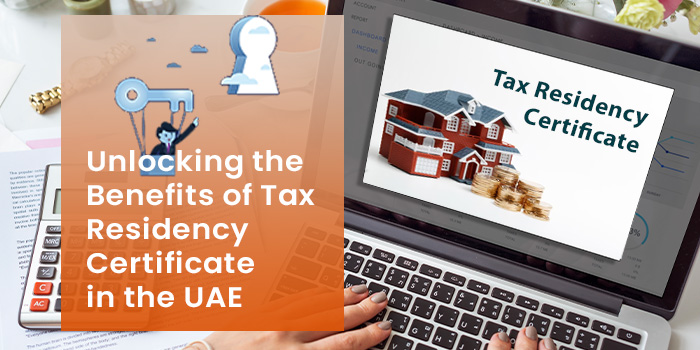Are you a taxpayer in the UAE tired of constantly being asked to provide a Tax Residency Certificate? Do you feel unsure about what this document even means? No need to worry, as Elevate is here to provide you with all the essential information about this obscure document in the simplest way possible.
Looking to escape income taxes? It’s easy – just prove your United Arab Emirates tax residence! At Elevate, we’ll show you the way to tax-free earnings by using most appropriate tax planning.
Say goodbye to tax worries and hello to financial freedom – just read on to learn more!
What is a Tax Residency Certificate?
A Tax Residency Certificate (TRC) is a document issued by a tax authority of a country that confirms an individual or a company’s tax residency status. It proves that the holder is a tax resident of a particular country and is liable to pay taxes on their worldwide income.
For instance, in the UAE, the Federal Tax Authority (FTA) issues the TRC as evidence that the holder is a tax resident of the UAE and eligible to receive benefits under the UAE’s tax treaties with other countries.
What is the Significance of Tax Residency Certificates in the UAE?
A Tax Residency Certificate holds great importance for individuals and businesses in the UAE due to several reasons.
Firstly, it helps to prevent double taxation, which occurs when the same income is taxed in two different countries. By providing evidence of tax residency in the UAE, a Tax Residency Certificate enables individuals and businesses to claim benefits under the UAE’s tax treaties with other nations and avoid being taxed twice.
Moreover, when individuals or businesses engage in international transactions or investments, foreign countries often request a Tax Residency Certificate. The certificate serves as proof that the holder is a tax resident of the UAE and can claim the benefits of the UAE’s tax treaties with other countries.
Who is Eligible to Obtain a Tax Residency Certificate in the UAE?
Individuals and businesses that are tax residents of the UAE can apply for a Tax Residency Certificate. To be considered a tax resident, an individual or entity must have lived or conducted business in the UAE for at least 183 days during the tax year, which runs from January 1 to December 31.
The application for a Tax Residency Certificate can be made by the individual or an authorized signatory on behalf of a business. However, those who are subject to taxation in other countries may need to provide additional documents like a tax clearance certificate to obtain a Tax Residency Certificate.
Seeking professional advice from a tax expert service provider like Elevate can ensure that all necessary documentation is provided during the application process.
What are the Steps to Obtain a Tax Residency Certificate in the UAE?
To qualify for the TRC as an individual, one must reside in the United Arab Emirates for more than six months. Elevate provides various options to become a UAE resident with ease.
For example, our corporate governance services can be helpful in this regard. Businesses that have been legally established for at least a year and are effectively managed from the UAE are also eligible for the Tax Residency Certificate.
Required Documents for Obtaining a Tax Residency Certificate in the UAE
Individuals and businesses must provide the following documents to obtain a Tax Residency Certificate in the UAE:
- Copy of the Emirates ID of the applicant.
- Copy of the applicant’s passport.
- Copy of the applicant’s residency visa.
- Proof of residency, such as a utility bill or tenancy agreement.
- Bank statement from a UAE-based bank displaying the applicant’s transactions for the past six months.
- Employment letter from the applicant’s employer that confirms the individual’s job position and salary. (In case of individual)
- For businesses, a copy of the trade license and the Memorandum of Association.
It’s important to ensure that all the required documentation is complete and accurate to avoid any delays or complications in obtaining the Tax Residency Certificate.
Different Types of Tax Residency Certificates Available in the UAE
In the United Arab Emirates (UAE), there are two types of tax residency certificates that individuals and businesses can obtain:
a) Tax Domicile Certificate (TDC): A Tax Domicile Certificate (TDC) is a document issued by the Federal Tax Authority (FTA) to individuals who are tax residents in the UAE. This certificate provides proof of an individual’s tax residency status in the UAE and is usually required when individuals are claiming tax benefits under a double taxation agreement.
b) Tax Residency Certificate (TRC): A Tax Residency Certificate (TRC) is issued by the Ministry of Finance to businesses that are tax residents in the UAE. The TRC serves as evidence that the business is a resident of the UAE for tax purposes and can be used to claim tax benefits under a double taxation agreement.
It is crucial to obtain the right certificate for your specific needs, as the TDC and TRC serve different purposes. Moreover, both the TDC and TRC require annual renewal and adherence to certain conditions and requirements, such as keeping accurate financial records and submitting tax returns on time.
Seeking assistance from experienced tax service provider consultants, such as Elevate, can be beneficial in ensuring a smooth and effective process.
Advantages of Holding a Tax Residency Certificate in the UAE
Having a Tax Residency Certificate in the UAE offers several benefits for both individuals and businesses.
The UAE has entered into tax treaties with more than 115 countries, enabling individuals and businesses to claim tax benefits such as tax exemptions, reduced withholding tax rates, and tax credits.
A Tax Residency Certificate is necessary to claim these benefits under the tax treaties. For instance, if an individual or business earns income from a country that has signed a tax treaty with the UAE, they may be eligible for reduced withholding tax rates on that income. Without a Tax Residency Certificate, they may have to pay the standard withholding tax rate, which can be much higher.
Additionally, holding a Tax Residency Certificate can help avoid disputes with foreign tax authorities. If an individual or business does not have a Tax Residency Certificate, foreign tax authorities may consider them as a tax resident of their country, resulting in double taxation and disputes.
Tax Treaties and Benefits of Having a Tax Residency Certificate in the UAE
Tax treaties refer to bilateral agreements between two countries that aim to prevent tax evasion and eliminate double taxation. In the UAE, there are over 115 countries with which the country has signed tax treaties, including Canada, Australia, the United States, and the United Kingdom.
Each tax treaty specifies tax rules and benefits that apply to taxpayers of both countries. These rules cover aspects such as the types of income subject to tax, the applicable tax rates, and the dispute resolution procedures between the tax authorities.
To claim the benefits of tax treaties, having a Tax Residency Certificate is essential. The certificate serves as proof of tax residency in the UAE and eligibility to claim treaty benefits.
The benefits of tax treaties vary based on the specific treaty and the type of income earned. Here are some common benefits:
- Reduced withholding tax rates: Tax treaties often provide reduced withholding tax rates on specific types of income such as interest, dividends, and royalties.
- Tax exemptions: Certain tax treaties provide exemptions on some types of income like pensions and capital gains.
- Tax credits: Some tax treaties may enable taxpayers to claim a tax credit in their home country for the taxes paid in the foreign country.
Cost of obtaining a Tax Residency Certificate in the UAE
The cost of obtaining a Tax Residency Certificate in the UAE varies depending on the method of application. Additional fees may apply for review and submission, depending on the chosen option. However, partnering with industry experts can help individuals and businesses avoid unnecessary costs and benefit from various cost-effective services.
Elevate’s Expertise in Obtaining Tax Residency Certificate in the UAE
Obtaining a Tax Residency Certificate in the UAE is a crucial requirement for individuals and businesses to establish their tax residency status in the country. However, the process can be complex, and it’s vital to obtain the correct type of certificate and ensure compliance with local tax laws and regulations.

